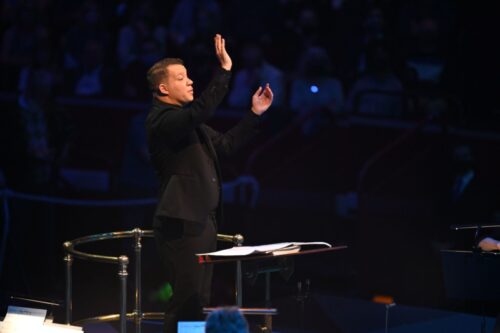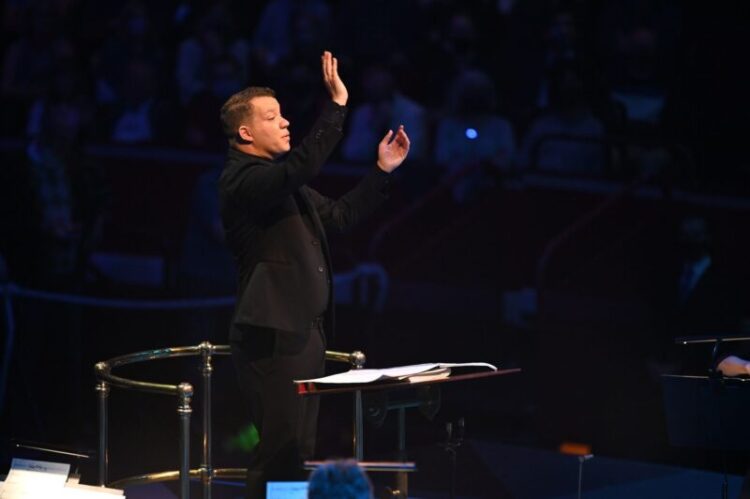 United Kingdom Walton, Shostakovich: Steven Isserlis (cello), BBC National Orchestra of Wales / Ryan Bancroft (conductor). St David’s Hall, Cardiff, 9.06.2022. (PCG)
United Kingdom Walton, Shostakovich: Steven Isserlis (cello), BBC National Orchestra of Wales / Ryan Bancroft (conductor). St David’s Hall, Cardiff, 9.06.2022. (PCG)

Walton – Cello Concerto (1955-1956)
Shostakovich – Symphony No.10 in E minor, Op.93 (1953)
Alan Bush once told me of a conversation with his friend and fellow-composer Dmitri Shostakovich. The Russian had categorically assured him that he never altered a note of any score of his once it had been consigned to paper. Bush did not wholly approve of this attitude – he always felt that a composition should be open to revision or amendment in the light of practical experience – but he clearly admired what he perceived as the certitude of approach of his fellow practitioner of ‘socialist realism’. (Let us note that Bush had been a committed communist long before Shostakovich somewhat reluctantly joined the party in the late 1950s.) In fact, Shostakovich’s contention was not entirely accurate; he certainly altered Lady Macbeth of Mtsensk substantially before the revival of the opera after the death of Stalin.
The whole story has always made me slightly uneasy: some Shostakovich passages might in hindsight have benefited from excision, revision or reconsideration. But it is decidedly not the case with the Tenth Symphony, where not a bar is wasted and nothing is superfluous. The Tenth was the last in a series of seven largely non-programmatic, purely instrumental symphonies; there followed four works with specific programmes or texts, before the enigmatic Fifteenth brought the cycle to a close a couple of years before Shostakovich’s death.
The Fifteenth was decidedly an autobiographical statement. There are self-quotations from earlier scores, as well as significant phrases from Rossini and Wagner meant to symbolise such concepts as freedom and fate. In the case of the Tenth the evidence is highly disputed and contradictory. Even so, I think we can also clearly identify autobiographical elements, most notably Shostakovich’s troubled relationship with Stalin – the work appeared only after Stalin’s death. The violently rampaging second movement has a sense of manic paranoia that surely summarises the essence of the dictator. This music menacingly returns in the fourth movement only to be capped by the composer’s own DSCH motif; that can surely only mean that the composer has survived persecution to emerge into new if not entirely untroubled sunlit uplands. Once we accept the premise, it becomes easier to recognise in the cheeky third movement a self-portrait of the composer (the satirical iconoclast pokes quiet fun at the system), and even perhaps to see in the waltz rhythms a subtle reference to Shostakovich’s friend Prokofiev.
Conductor Ryan Bancroft did engage with the sense of despair and outrage which rages through the music. The scherzo found him leaping into the air; the red soles of his shoes gave a positively explosive display to match the excitement of the playing. In sections like this, the best the conductor can do is simply let the orchestra have its head – and the sheer volume and brilliance of the technique on display was breathtaking. There was also plenty of variety of colour elsewhere, from the chilliness at the opening to the bubbling exhilaration of the finale. Let me give one example, from near the end of the scherzo. Shostakovich takes the massed double basses into their highest register with a repeated series of briefly screaming phrases which in most performances are overwhelmed by the savage tumult elsewhere in the orchestra. Here, one could actually hear the demented shrieks. This helped demonstrate that the composer was from deluded: he was actually eminently practical. Bancroft as usual eschewed the use of a baton, but he generally maintained the close control of the ensemble even during the most pell-mell passages. The fair-sized audience bellowed their prolonged approval at the end.
Mind you, quite a few of listeners around me had left at the interval after the performance of Walton’s Cello Concerto. They presumably attended in order to hear Steven Isserlis. The programme was indeed oddly contrasted, despite an attempt to bind the two halves with the title Romance and Revolution. Walton’s scoring, translucent in his best post-war Ischian manner, is a far cry indeed from Shostakovich’s barbarities. Even his typically sardonic scherzo second movement is witty rather than barbed. Isserlis was clearly totally in sympathy with the music. He communed inwardly with the opening Moderato and almost seemed to physically embrace the orchestral contributions to the Mediterranean atmosphere. He could do less with the somewhat ramshackle construction of the finale where two cadenzas surround a central section with the soloist reduced to the role of a silent spectator. Still, he conjured up a sense of real enchantment in the unexpectedly subdued closing section of the concerto. It was not his fault that the ensuing moment of magical silence was destroyed in a thoughtless instant by the ringing of a mobile phone in the pocket of someone in the front of the stalls. Understandably annoyed, he commented upon this unwanted intrusion before giving us an even more spellbinding performance of the Casals arrangement of the Song of the Birds as an encore.
One can hope that the BBC engineers will be able to excise the offending interruption when the concert is broadcast, but it is not even clear when the concert will be broadcast. The programme says that it would be scheduled for an afternoon concert on Radio 3 at some unspecified date in the future. In fact, in the post-pandemic days this afternoon slot increasingly becomes a random collection of recordings from various sources and broadcasting companies, in the same manner as the night-time schedules. It resembles much less the home-based series of genuine live concerts which had been the norm. Perhaps in the new season, with more time for planning, such concerts can begin to re-establish themselves in the schedules. Be that as it may, both items from this evening will be well worth searching out when they do finally reach broadcast either conjointly or separately. In the meantime, let me say that the concert was a thoroughly worthwhile experience, and an excellent conclusion to Ryan Bancroft’s first post-pandemic season as principal conductor with this orchestra.
Paul Corfield Godfrey
